Dry fruits are an excellent source of vitamin B12, a crucial nutrient for the health of our cells. Vitamin B12 is necessary for proper cell function, including the cells in our blood and nerves. It plays a role in DNA synthesis and helps prevent anemia and heart-related diseases. Including vitamin B12-rich dry fruits in your diet can boost immunity, support nerve health, and promote overall well-being.
Why Vitamin B12 is Important for Your Body
Vitamin B12 plays a vital role in maintaining overall health and well-being. This essential vitamin is involved in various physiological processes, ensuring the proper functioning of our body. From the formation of DNA to the development of brain cells and the production of red blood cells, vitamin B12 is an indispensable nutrient.
One of the key benefits of vitamin B12 is its role in supporting nerve health. It helps in the maintenance of the myelin sheath, which protects and insulates nerve cells, ensuring efficient transmission of nerve signals. Adequate intake of vitamin B12 also aids in preventing anemia by promoting the production of red blood cells.
In addition to its physical health benefits, vitamin B12 also contributes to mental well-being. It plays a crucial role in brain function and cognition, helping to maintain proper memory and concentration. Vitamin B12 deficiency can lead to symptoms such as weakness, fatigue, and nerve problems, emphasizing the importance of incorporating this nutrient into our diet.
The Role of Vitamin B12 in the Body
Vitamin B12 is involved in several key biochemical reactions in the body, including the conversion of food into energy. It aids in the metabolism of carbohydrates and fats, ensuring that our body can efficiently utilize these nutrients. Vitamin B12 also supports the production of neurotransmitters, which are crucial for proper brain function and mood regulation.
Furthermore, vitamin B12 is essential for the production of DNA, the genetic material present in all cells. It helps in the synthesis of new DNA molecules during cell division, ensuring the proper growth and development of our body. Adequate vitamin B12 intake is particularly important during pregnancy, as it supports the growth of the fetus and helps prevent certain birth defects.
Conclusion
The importance of vitamin B12 for our body cannot be overstated. From supporting nerve health and preventing anemia to promoting brain function and DNA synthesis, this vital nutrient plays a crucial role in various physiological processes. Incorporating vitamin B12-rich foods, including dry fruits, into our diet is an effective way to ensure an adequate intake of this essential vitamin and maintain optimal health and well-being.
Dry Fruits as a Source of Vitamin B12
| Dry Fruit | Vitamin B12 Content |
|---|---|
| Raisins | No significant amount |
| Cashews | No significant amount |
| Walnuts | No significant amount |
| Pistachios | No significant amount |
| Almonds | Contains a small amount, but is not a significant source |
Key points:
- None of the specified dry fruits (raisins, cashews, walnuts, pistachios, almonds) are significant sources of vitamin B12.
- Most plants foods, including dry fruits, do not naturally contain vitamin B12 except in very minute traces. Significant vitamin B12 sources are primarily animal-based foods like meat, fish, eggs and dairy.
- For vegetarians and vegans, the main ways to get vitamin B12 are through fortified foods like cereals and plant-based milks, nutritional yeast, supplements or possibly through certain types of seaweed.
So in summary, while dry fruits are very healthy and nutritious in many other ways, they do not provide significant amounts of vitamin B12. People following plant-based diets need to get vitamin B12 from other vegetarian sources. Let me know if you need any clarification or have additional questions!
Almonds – A Fantastic Snack Full of Nutrients
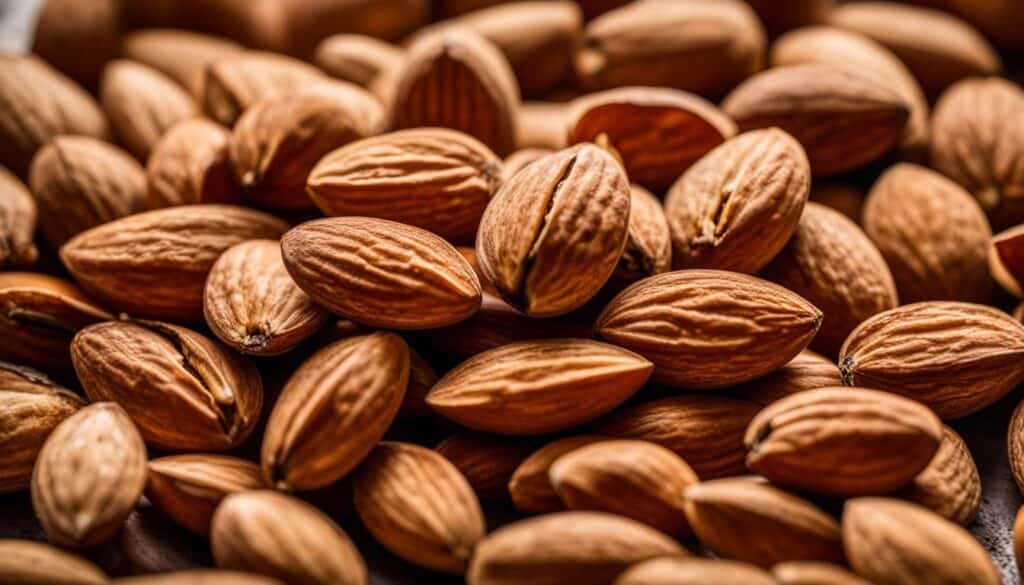
When it comes to vitamin B12-rich dry fruits, almonds are a top contender. Not only are they packed with essential nutrients, but they also offer a delicious crunch that makes them a perfect snack option. Almonds contain a moderate amount of vitamin B12, along with other beneficial vitamins and minerals.
“Almonds are a nutritional powerhouse, providing not only vitamin B12 but also vitamin E, fiber, calcium, and magnesium,”
Consuming almonds regularly can have numerous health benefits. The vitamin E in almonds acts as a powerful antioxidant, protecting the body against oxidative stress and reducing inflammation. Almonds are also beneficial for heart health, as they contain monounsaturated fats that can help lower LDL cholesterol levels. Additionally, the fiber content in almonds promotes healthy digestion and can aid in weight management.
If you’re looking for a convenient and tasty way to boost your vitamin B12 intake, look no further than almonds. Enjoy a handful of almonds as a snack, add them to your favorite recipes, or sprinkle them on top of salads and desserts. It’s a simple and delicious way to support your overall health and well-being.
| Nutrient | Amount per 100g |
|---|---|
| Vitamin B12 | 0.0 mcg |
| Protein | 21.2 g |
| Fiber | 12.5 g |
| Calcium | 264 mg |
| Magnesium | 270 mg |
Walnuts – A Nutrient-Dense Nut with Vitamin B12
When it comes to dry fruits rich in vitamin B12, walnuts are a standout option. Not only do they provide a delicious and satisfying crunch, but they also offer a host of health benefits. Walnuts are packed with essential nutrients, making them a nutrient-dense addition to your diet.
In addition to being a good source of vitamin B12, walnuts are rich in omega-3 fatty acids, which are known for their anti-inflammatory properties and their role in supporting heart health. These healthy fats can help lower cholesterol levels and reduce the risk of heart disease.
Furthermore, walnuts are a great source of antioxidants that can help protect your cells against damage caused by harmful free radicals. They also contain important minerals such as manganese, calcium, magnesium, and iron, which are essential for various bodily functions.
Adding walnuts to your diet is a smart choice for boosting your vitamin B12 intake while enjoying a tasty and nutritious snack. You can sprinkle them on top of salads, oatmeal, or yogurt, or simply enjoy them on their own for a quick and convenient source of essential nutrients.
Dates – A Sweet Source of Vitamin B12
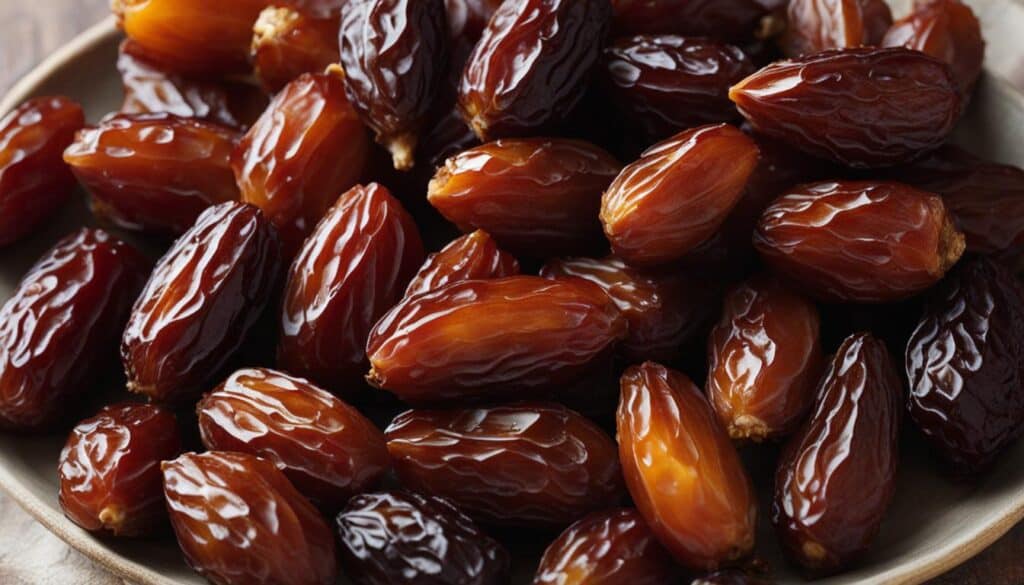
When it comes to vitamin B12-rich dry fruits, dates are a sweet and delicious option. Dates contain a moderate amount of vitamin B12, making them a great choice for boosting your intake of this essential nutrient. Not only do dates provide vitamin B12, but they also offer a range of health benefits.
One of the notable health benefits of dates is their high fiber content. Fiber is essential for digestive health and can help regulate bowel movements. Additionally, dates are rich in potassium, which plays a vital role in maintaining healthy heart function and managing blood pressure levels.
Furthermore, dates are a natural source of energy due to their high sugar content. They can provide a quick burst of energy and are an excellent alternative to refined sugar. Dates also contain various vitamins and minerals, including vitamin A and vitamin K, which contribute to overall well-being.
Incorporating dates into your diet is easy. You can enjoy them as a standalone snack, chop them up and add them to your favorite salads or desserts, or even use them as a natural sweetener in baking recipes. With their sweet taste and vitamin B12 content, dates are a versatile dry fruit that can enhance both the flavor and nutritional value of your meals.
Table: Nutritional Content of Dates
| Nutrient | Amount per 100g of Dates |
|---|---|
| Calories | 282 |
| Carbohydrates | 75g |
| Fiber | 8g |
| Protein | 2g |
| Fat | 0.4g |
| Vitamin B12 | 0.03mcg |
| Potassium | 696mg |
| Vitamin A | 149IU |
| Vitamin K | 2.7mcg |
“Dates are not only a delicious and versatile fruit but also provide essential nutrients like vitamin B12. Incorporating dates into your diet can be a simple yet effective way to support your overall health and well-being.” –
Cashews – Nutty Delights with Vitamin B12
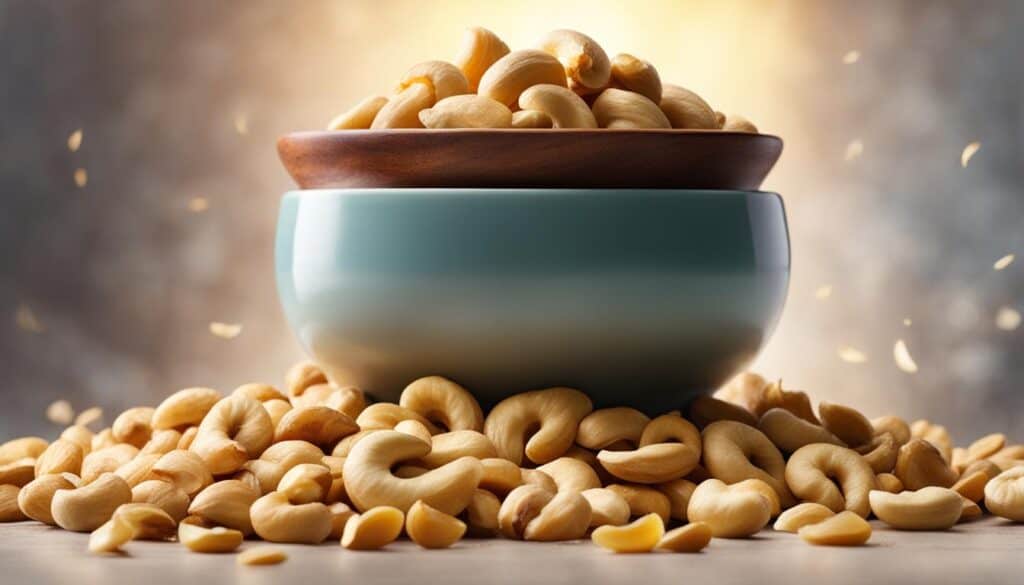
Cashews are not only a delicious snack but also a great source of vitamin B12. These nutrient-dense nuts are packed with a variety of essential vitamins and minerals that contribute to your overall health. Including cashews in your diet can provide you with numerous health benefits and help meet your daily vitamin B12 requirements.
One of the significant health benefits of cashews is their role in supporting heart health. Cashews are rich in monounsaturated fats, which are heart-healthy fats that can help lower bad cholesterol levels and reduce the risk of heart disease. They also contain antioxidants like vitamin E, which further supports cardiovascular health.
In addition to promoting heart health, cashews also contribute to maintaining strong bones and supporting a healthy immune system. These nuts are a good source of magnesium, which is essential for bone strength and density. They also contain zinc, a vital mineral for immune function and wound healing.
| Amount per 100g | |
|---|---|
| Vitamin B12 | 0.6μg |
| Protein | 15g |
| Fat | 47g |
| Carbohydrates | 30g |
| Fiber | 3.3g |
| Calcium | 37mg |
| Iron | 6.7mg |
Adding cashews to your diet can provide a delicious way to increase your vitamin B12 intake while enjoying a satisfying and nutritious snack. Remember to consume them in moderation as they are calorie-dense. Including a handful of cashews in your daily diet can help you maintain optimal health and support your vitamin B12 requirements.
Pistachios – Colorful Nuts with Vitamin B12
When it comes to vitamin B12-rich dry fruits, pistachios are a colorful and nutritious option to consider. These vibrant green nuts not only add visual appeal to your snack time but also provide essential nutrients, including vitamin B12. Incorporating pistachios into your diet can offer numerous health benefits and support your overall well-being.
One of the key advantages of pistachios is their vitamin B12 content. This vital nutrient plays a crucial role in maintaining healthy nerve function and supporting the formation of red blood cells. By including pistachios in your daily routine, you can boost your vitamin B12 intake and help prevent deficiencies that may lead to fatigue, weakness, and other health issues.
In addition to vitamin B12, pistachios are rich in fiber, protein, healthy fats, and various antioxidants. These nutrients work together to support digestive health, promote satiety, and protect against oxidative stress. The combination of these beneficial compounds makes pistachios a great choice for maintaining heart health, managing weight, and reducing the risk of chronic diseases.
The Nutritional Breakdown of Pistachios
| Nutrient | Amount per 1 ounce (28g) |
|---|---|
| Vitamin B12 | 0.6 mcg |
| Fiber | 2.9 g |
| Protein | 5.9 g |
| Healthy Fats | 13 g |
| Antioxidants | Vitamin E, lutein, zeaxanthin |
As shown in the table above, a 1-ounce (28g) serving of pistachios provides approximately 0.6 mcg of vitamin B12. This amount contributes to meeting your daily vitamin B12 needs and supports your overall health. Alongside vitamin B12, pistachios also contain a good amount of fiber, protein, and heart-healthy fats. These nutrients make pistachios a satisfying snack that can help regulate blood sugar levels, promote satiety, and support weight management.
In summary, pistachios are not only delicious but also offer a valuable source of vitamin B12. Incorporating these colorful nuts into your diet can help boost your vitamin B12 intake and support various aspects of your health, including nerve function and the formation of red blood cells. So go ahead, grab a handful of pistachios, and enjoy the benefits they bring to your overall well-being.
Hazelnuts – Exotic Dry Fruits with Vitamin B12
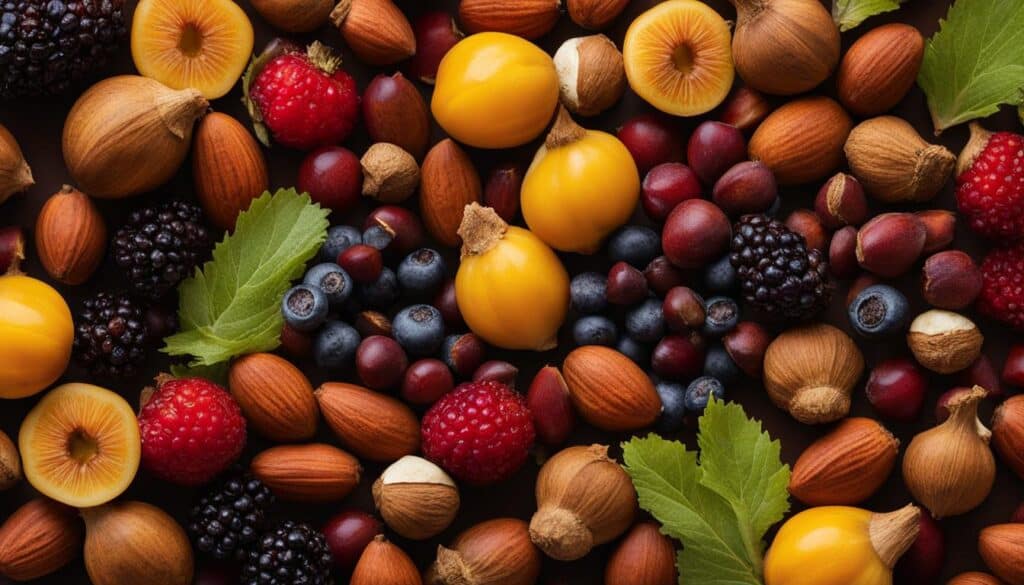
Hazelnuts, also known as filberts, are exotic dry fruits that are not only delicious but also contain a significant amount of vitamin B12. These small, round nuts offer a range of health benefits and are a perfect addition to any diet.
The vitamin B12 content in hazelnuts makes them a valuable plant-based source of this essential nutrient. Adequate intake of vitamin B12 is crucial for maintaining optimal health and preventing deficiencies, which can lead to weakness, fatigue, anemia, and nerve problems. Including hazelnuts in your daily diet can help ensure you meet your recommended vitamin B12 intake.
In addition to vitamin B12, hazelnuts are rich in other beneficial nutrients. They contain proteins, fiber, polyphenols, calcium, and potassium. These nutrients contribute to various health benefits, including reducing the risk of cancer, controlling blood sugar levels, and supporting digestive health.
The Nutritional Profile of Hazelnuts
| Nutrient | Amount per 100g |
|---|---|
| Calories | 628 |
| Protein | 14.1g |
| Fat | 60.8g |
| Carbohydrates | 16.7g |
| Fiber | 9.7g |
| Potassium | 680mg |
| Calcium | 114mg |
| Iron | 4.7mg |
As part of a balanced diet, hazelnuts can be a delicious and nutritious snack. They can be enjoyed on their own or added to various dishes, such as salads, desserts, or even as a topping for oatmeal or yogurt.
Next time you’re looking for a healthy and flavorful snack, consider hazelnuts. Not only do they provide vitamin B12, but they also offer a range of other essential nutrients that can contribute to your overall well-being.
Pecan Nuts – Nutritious Delights with Vitamin B12
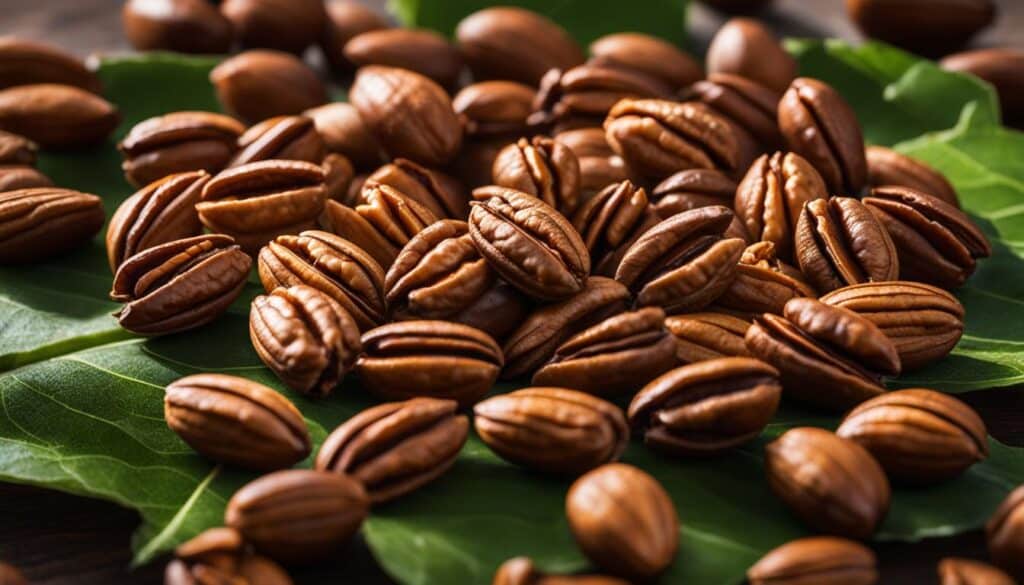
Pecan nuts are not only a tasty snack but also a great source of vitamin B12. They offer a range of health benefits, making them a nutritious addition to your diet.
One of the key advantages of pecan nuts is their high vitamin B12 content. This essential vitamin plays a crucial role in maintaining healthy nerve function and red blood cell production. Incorporating pecan nuts into your meals or enjoying them as a snack can help ensure you meet your daily vitamin B12 requirements.
In addition to vitamin B12, pecan nuts are packed with various other nutrients. They are an excellent source of healthy fats, including monounsaturated fats, which can help improve heart health. Pecan nuts also provide fiber, protein, and essential minerals like magnesium and zinc.
To reap the benefits of pecan nuts, consider adding them to your salads, oatmeal, or baked goods. Their rich, buttery flavor adds a delicious touch to any recipe. Just be mindful of portion sizes, as pecan nuts are calorie-dense. A handful of pecan nuts a day can contribute to a well-rounded and healthy diet.
| Nutrition Facts for Pecan Nuts (28g) | Amount per serving |
|---|---|
| Calories | 196 |
| Total Fat | 20.4g |
| Protein | 2.6g |
| Carbohydrates | 3.9g |
| Fiber | 2.7g |
| Vitamin B12 | 1.2mcg |
With their impressive nutritional profile and vitamin B12 content, pecan nuts are a healthy and delicious snack option. Enjoy them in moderation as part of a balanced diet to reap their numerous health benefits.
Conclusion
After exploring the role of vitamin B12 in our body and the benefits it offers, it is clear that incorporating vitamin B12-rich dry fruits into our diet is a wise choice. These dry fruits, such as almonds, walnuts, cashews, pistachios, dates, hazelnuts, figs, and pecan nuts, not only provide a good amount of vitamin B12 but also offer a range of other essential nutrients.
By including these flavorful and nutrient-dense snacks in our daily diet, we can boost our overall health and well-being. Vitamin B12 is crucial for proper cell function, DNA synthesis, and the development of brain and nerve cells. It also helps prevent anemia, supports heart health, and boosts immunity.
So, whether you are looking to increase your vitamin B12 intake or simply want to enjoy a tasty and healthy snack, consider adding these vitamin B12-rich dry fruits to your diet. Take advantage of the benefits they offer and make them a part of your daily routine. Your body will thank you for it!
FAQ
What are the best dry fruits for vitamin B12?
Some of the best dry fruits for vitamin B12 include almonds, walnuts, pecans, hazelnuts, figs, cashews, pistachios, and dates.
Why is vitamin B12 important for the body?
Vitamin B12 is important for various physiological processes in the body, including DNA formation, brain and nerve cell development, and red blood cell production.
What are some plant-based sources of vitamin B12?
Dry fruits such as almonds, walnuts, pecans, hazelnuts, figs, cashews, pistachios, and dates are some plant-based sources of vitamin B12.
What are the health benefits of almonds?
Almonds are packed with essential nutrients and offer benefits such as improved heart health, aid in weight management, and control of blood sugar levels.
Why are walnuts considered nutrient-dense?
Walnuts are nutrient-dense because they provide a significant amount of vitamin B12 and are rich in omega-3 fatty acids, manganese, calcium, magnesium, and iron.
What are some health benefits of dates?
Dates are delicious dry fruits that contain vitamin B12 and provide benefits such as energy boost, improved digestive health, and potential benefits for pregnant women.
What are the health benefits of cashews?
Cashews are nutrient-dense nuts that offer a moderate amount of vitamin B12 and provide benefits such as promoting healthy skin, boosting the immune system, and supporting bone health.
What are the health benefits of pistachios?
Pistachios are vibrant green dry fruits that are a good source of vitamin B12 and offer benefits such as delaying the onset of old age, improving eye health, and promoting heart health.
Why are hazelnuts considered exotic dry fruits?
Hazelnuts, also known as filberts, are exotic dry fruits that contain vitamin B12 and offer benefits such as lower risk of cancer, control of blood sugar levels, and support for digestive health.
What are the health benefits of pecan nuts?
Pecan nuts are a delicious and nutritious dry fruit that provide a small amount of vitamin B12 and offer benefits such as reducing the risk of cancer, supporting heart health, and improving gut health.
How can dry fruits with vitamin B12 benefit my diet?
Dry fruits with vitamin B12 provide a convenient and delicious way to boost your vitamin B12 intake, along with other beneficial nutrients like fiber, protein, and antioxidants.

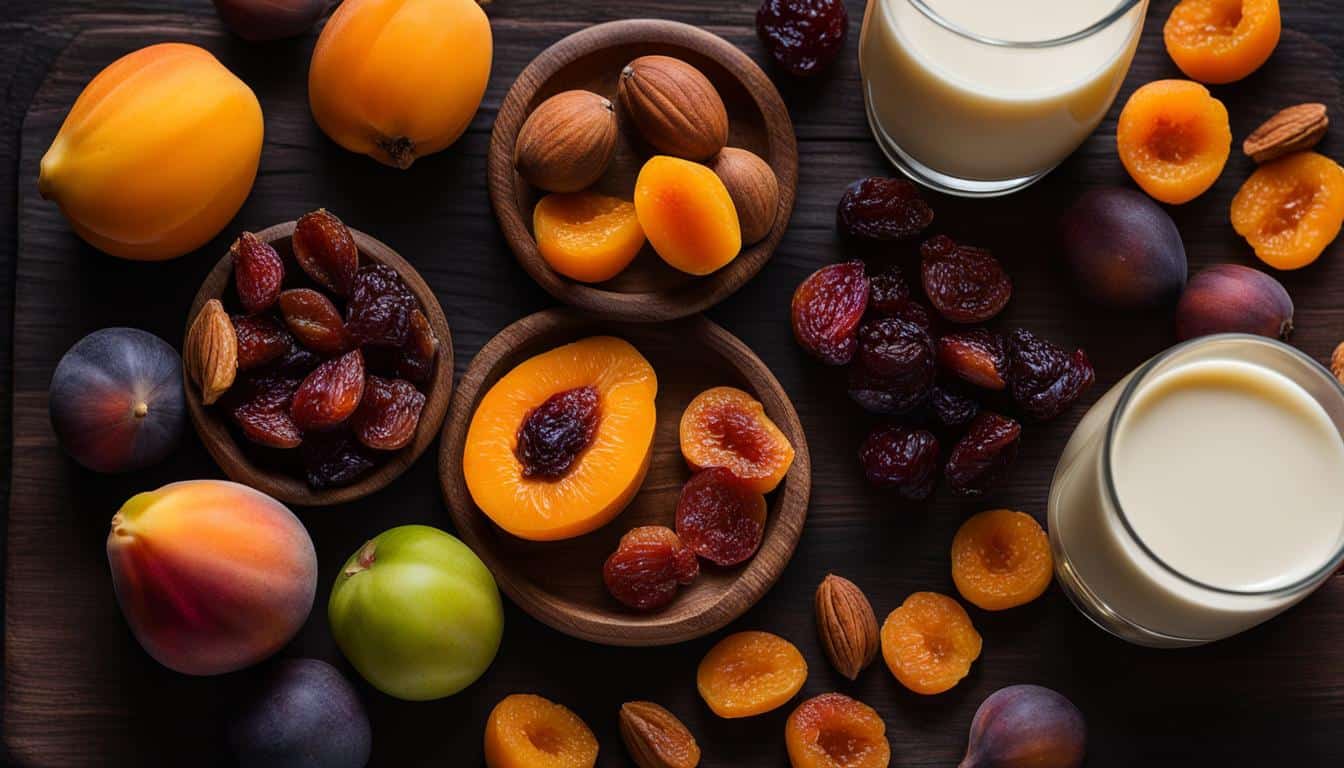



Leave a Reply